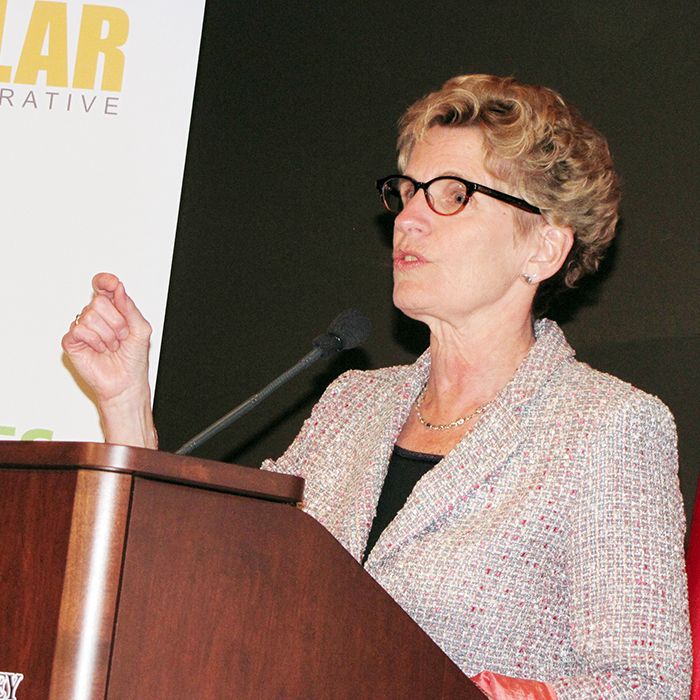
Premier Kathleen Wynne is sticking to the plan for a greener economy in Ontario as concerns rise over high electricity costs.
The premier, who is also the Minister of Agriculture and Food, was in Chatham-Kent on Wednesday to celebrate renewable energy production in the area.
LEADWAVE Technologies from Chatham Voice on Vimeo.
Speaking at the annual meeting of the AGRIS Solar Co-operative at the John D. Bradley Convention Centre, Wynne reaffirmed her government’s support of green energy.
“We’re working with you to make sure it evolves in the best way possible, but we are very committed to making sure this part of the economy grows and the energy supply includes clean, renewable energy into the future,” she said.
As for the higher electricity costs, Wynne said there are more factors at play than the Green Energy Act.
According to Wynne, Ontario’s electricity system was in bad shape ten years ago and needed to be transformed.
“Beyond generating cleaner, greener sources of energy, we needed to renew and upgrade our entire electricity system infrastructure, and that’s where the costs are,” said Wynne.
As an example, she noted that more than 10,000 kilometres of transmission lines have been rebuilt.
Wynne also noted the province will remove the debt retirement charge from electricity bills at the end of 2015 when the Green Energy Benefit expires.
Before she spoke at the AGRIS Solar Co-operative’s annual meeting, Wynne toured the farm of Jim and Janet Nauta near Blenheim to see one of the many solar power units managed by the farmer-owned energy company.
The co-op has received approval to finish the construction of more than 1,000 units in the province.
“We’ve got all our contracts, we’ve got all our connection agreements, we’ve got our notice to proceed with construction so we can put our shovels in the ground,” said Andrew Clark, general manager of the co-op.
Members contribute $20,000 towards the capital cost of installing a solar module.
“The members get to invest in their energy and, therefore, get the dividends from their energy,” said Clark of the locally-owned project. “So money comes from the community and goes back into the community.”
Similar to the traditional farm co-operative model, the investment risk is spread out among the members.
“The risk is diversified across the membership. They don’t own one unit, they own a piece of 1,000 units,” said Clark. “Their sun might not be as good as their neighbours, so they’re getting better production.”
Members will sell the electrical power generated to Ontario Power Authority who is contractually obligated to purchase the power for a period of 20 years.
The Co-op’s assets from the projects are expected to total more than $70 million.






Of course they're staying the course on green energy. We already know that every Liberal and their brother-in-law has their mitts in the green energy subsidy trough. And as long as they have their city lemmings convinced that it's a good thing, they'll keep making fortunes on the backs of working Ontarians. Thieves and crooks the whole lot of them..
No actually Laura the thieves are the Nat Gas and fossil fuel industries that do not want alternatives to their monopolies. I would love my neighbour to make money on a FIT contract and then go spend in the local restaurant or Home Depot.
Brian Wark — Hate to break it to you Brian, but Big Oil IS Big Wind. Enbridge, Suncor, BP, Shell, etc are all into wind power. Meanwhile, FIT contracts are driving everyone from the middle class on down, including seniors and the disabled into fuel poverty. Wind energy is all about the money and nothing to do with saving the planet.